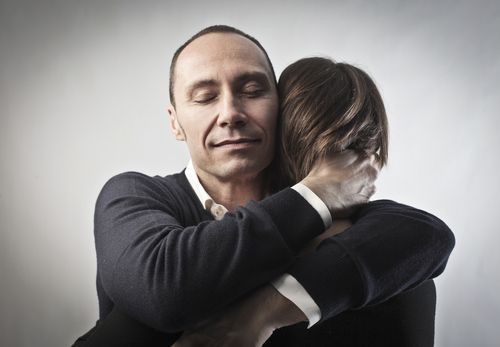Touch Is Powerful: A Reassuring Hand On The Shoulder Could Improve Mood In People With Low Self-Esteem

Anyone who’s ever been upset about something knows how comforting a hug can be. Touch is powerful, and it doesn’t have to be a firm hug to have an effect — a light touch from a stranger has been shown to raise a woman’s body temperature, for example. So it’s no wonder that, for people with low self-esteem, a light open-handed touch on the shoulder can improve their outlook, and help them confront their own mortality, a new study says.
While people with high self-esteem understand that death is imminent and that they should make the most out of life, those with low self-esteem may find it hard to deal with the concept of death, researchers said. They found that a light touch, even from an object that simulates touch, was effective in blocking existential fears among people who have low self-esteem.
“This is important because we all have to deal with existential concerns and we all have times at which we struggle to find the meaning of life,” lead researcher, Sander Koole of VU University Amsterdam, said in a statement. “Our findings show that people may still find existential security through interpersonal touch, even in the absence of symbolic meaning derived from religious beliefs or life values.”
Reacting To Death With and Without Touch
The researchers discovered this through a series of experiments. In the first, an experimenter approached college students, asking them to respond to surveys about their self-esteem and death. Upon receiving the surveys, some participants were also given an open-handed pat on the shoulder lasting about one second. The researchers found that those who had reported low self-esteem also reported being less anxious about death if they had gotten a touch on the shoulder. Going further, when participants were reminded about death, those who didn’t receive a touch became less socially connected, while those who did remained the same.
Next, the researchers wanted to see how people with low self-esteem would react to a teddy bear — a toy that simulates touch. They first tested participants on how much they valued the bear. Those who were reminded of death beforehand said it cost about €23 (about $31), while those who weren’t reminded of death valued it at €13. The researchers deduced that this differentiation in value could have been a result of participants longing for touch and comfort, which translated into a higher price.
When low self-esteemed participants were able to touch the bears, as opposed to a cardboard box, while estimating its value, levels of ethnocentrism dropped upon hearing of death. Ethnocentrism is a common defense mechanism deployed when people hear of death, the researchers said, perhaps because the participants denied any other way of looking at death than theirs.
“Our findings show that even touching an inanimate object — such as a teddy bear — can soothe existential fears,” Koole said. “Interpersonal touch is such a powerful mechanism that even objects that simulate touch by another person may help to instill in people a sense of existential significance.”
Although who or what is providing the touch could be a factor in how effective the response is, the researchers believe using touch could be an effective therapy against other disorders such as depression and anxiety, and even mention testing that’s already underway for a jacket that simulates hugs electronically.
According to the Centers for Disease Control and Prevention (CDC), depression affected more than one in 20 Americans, ages 12 and up, in a report taken between 2005 and 2006. What’s more, depression can lead to a number of other disorders, and was recently found to be the biggest cause of disability worldwide. Anxiety disorders affect even more people — about 40 million Americans — and include a range of disorders, such as phobias, obsessive compulsive disorder, post-traumatic stress disorder, and social anxiety disorder.
Source: Koole S, Sin M, Schneider I. Embodied Terror Management: Interpersonal Touch Alleviates Existential Concerns Among Individuals With Low Self-Esteem. Psychological Science. 2013.



























